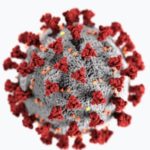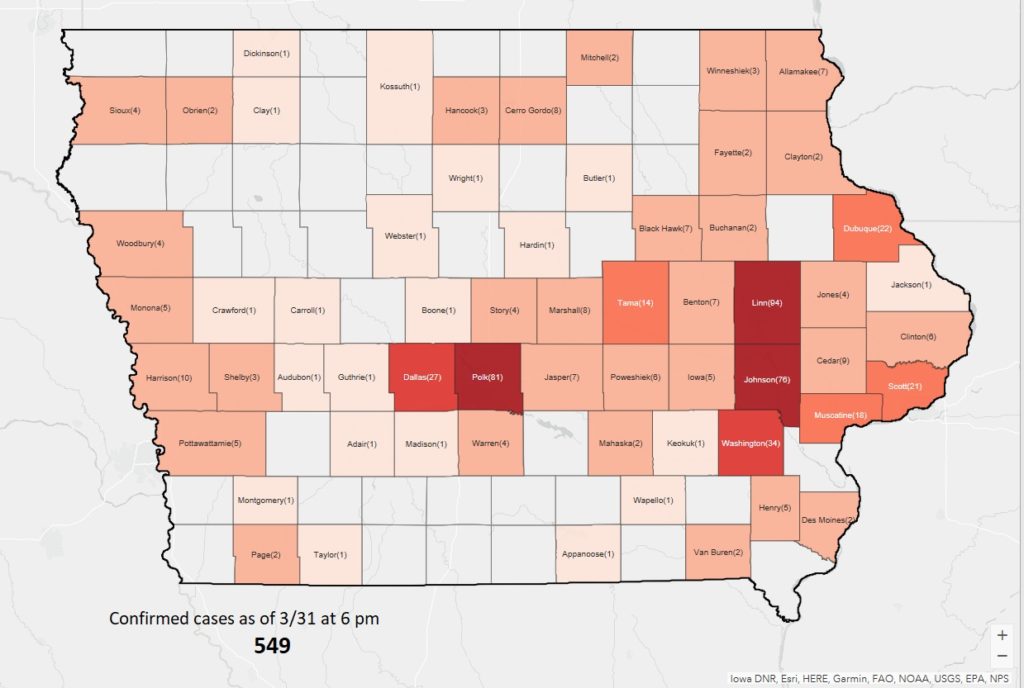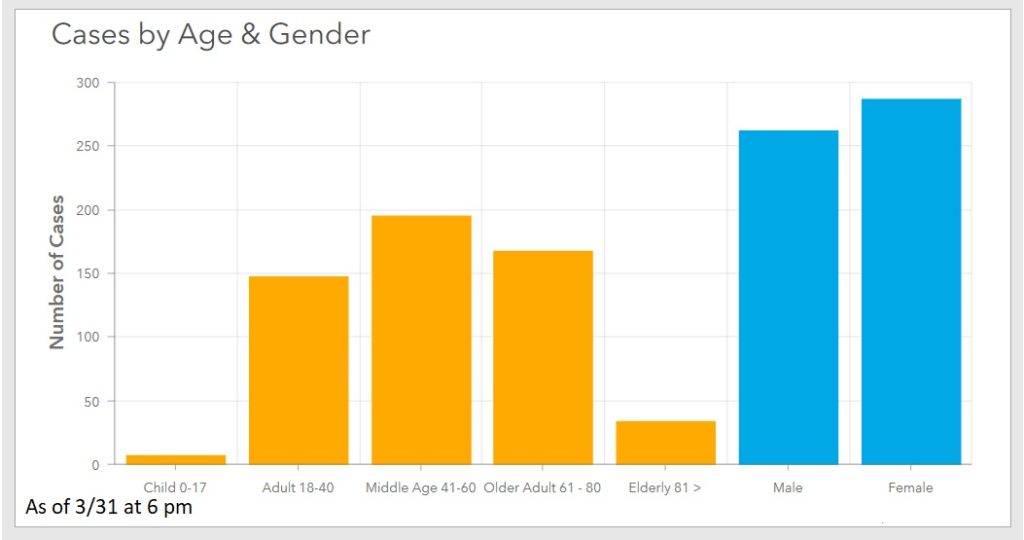 Watch for news Thursday about school calendar
Watch for news Thursday about school calendar
The COVID-19 pandemic and dealing with it has become ordinary enough that Gov Kim Reynolds at her April 1 press conference on the subject spoke for nearly a minute without naming the disease or the virus. That included reciting how many new positive cases were identified in the past 24 hours (52, for a total of 549), how many tested negative ( 416 for a total 7,304), how many tests are available at the State Hygienic lab (1,449); how many Iowans are hospitalized as of Tuesday evening (63); how many have recovered (118); and how many Iowans died yesterday (two, for a total of nine).
“When we first heard about an outbreak of an unknown virus across the globe, it seemed almost unimaginable it could have an impact on us, but in a very short amount of time, it has become a reality,” Reynolds read from notes.
She noted the number of COVID-19 cases is expected to spike in the next two to three weeks and said, “The actions of every Iowan matter, and we must all do our part to slow the spread of the virus and save lives.” She then reiterated what she has said for two weeks: stay home, work from home if you can, practice social distancing if remote work isn’t possible, practice good personal hygiene, and isolate yourself if you or someone in your household is sick.
“We continue to ask a lot, but we need everyone to take these simple steps seriously… It really is a difficult time. Iowans are feeling uncertain about their day-to-day life, and even more concerned about what’s to come in the weeks and months ahead.
“In a time when we’re focused on protecting our physical health, it’s also important that we don’t neglect our mental well-being,” Reynolds said.
She then called upon Gerd Clabaugh, director of the Iowa Department of Public Health, to explain what Iowans can do to be sure they’re taking care of themselves and their mental health as they “navigate the new normal during COVID-19 response.”
Clabaugh listed things to do at home:
1. Read and listen to trusted sources, including the IPDH website and the Centers for Disease Control website.
2. Unplug – Know when to take a break from the constant stream of information coming in.
3. Stay healthy – Prioritize sleep. Make a commitment to get eight hours of sleep a night. Get some exercise, and practice social distancing.
4. Control what you can – Wash your hands. Practice social distancing. Stay home as much as possible. “While fear of the unknown can be unsettling, taking control can make you feel empowered and counteract the stress you may be feeling,” he said.
Clabaugh named groups that may be in need of special support at this time:
• Older Iowans and those with chronic diseases – Loved ones should check in with them.
• Persons with pre-existing mental and health conditions should continue their treatment and watch for new or worsening conditions
• Children and teens need a predictable schedule
• Healthcare providers and first responders should learn the symptoms of traumatic stress, allow personal time, and take a break from media coverage.
He said someone with a decline in mental health, has suicidal thoughts, or is increasing use of drugs, alcohol, or gambling can contact Your Life Iowa at https://yourlifeIowa.org for information about available services. Your Life Iowa can also be contacted to texting 855-895-8398 or by calling 855-581-8111.
Your Life Iowa is sponsored by the IDPH and the Iowa Department of Human Services.
During the Q & A portion of the press conference, Reynolds gave little new information.
One reported quoted President Trump’s prediction of 240,000 deaths in the U.S. due to COVID-19 and asked what number was used for Iowa. Reynolds answered the modeling does not include mitigation efforts now underway, but she didn’t provide the number.
The University of Washington’s Institute for Health Metrics and Evaluation on Wednesday increased its projected number of deaths in Iowa to 1,300 by August. The next question was Reynolds was asked if that is the range she and the IDPH are looking at.
IDPH deputy director Sarah Reisetter said the IDPH is aware of the UW model, but said the number is based on schools not closing, while Iowa schools closed March 15. It doesn’t take into account non-essential business closures. “With any other model out there, there are assumptions that are made. Our goal in all of this is to prevent illness and death in our state so we’re making the recommendations to Gov Reynolds that we think need to be made, and that includes some of the things she has done,” Reisetter said.
Reynolds has said daily there are metrics she is looking at in determining whether any further restrictions are needed. She was once again asked for specific data. She listed what the metrics are but did not provide numbers.
The most significant news of the day came near the end of the press conference. Reynolds said she expects Thursday to issue an additional health emergency declaration that will address the question of whether schools will re-open April 13, the date named previously. “Right now we still haven’t reached the peak. That’s probably still two to three weeks out.” She then turned the question away from schools and said she’s also looking at metrics to know when the economy can be opened again as well.
A reporter asked about an upcoming horse auction in Wayne County that is expected to draw 100 people. There is concern, the reporter said, that the regulations are “worthless” because they allow such an event to take place.
Reynolds said horse auctions are not exempt because they’re part of the food chain, and that those who attend should practice social distancing.
Along with the statistics Reynolds gave at the opening of her press conference, the IDPH provides the locations and age ranges of the 52 newly diagnosed COVID-19 patients:
• Cerro Gordo County, 1 adult (18-40 years)
• Clayton County, 1 elderly adult (81+)
• Clinton County, 1 adult (18-40 years)
• Dallas County, 1 adult (18-40 years), 1 older adult (61-80 years)
• Des Moines County, 1 middle-age adult (41-60 years)
• Dubuque County, 1 middle-age adult (41-60 years)
• Harrison County, 1 older adult (61-80 years)
• Henry County, 1 adult (18-40 years), 1 older adult (61-80 years)
• Iowa County, 1 adult (18-40 years)
• Jasper County, 1 middle-age adult (41-60 years)
• Johnson County, 1 adult (18-40 years), 1 middle-age adult (41-60 years), 1 older adult (61-80 years)
• Linn County, 2 adults (18-40 years), 2 middle-age adults (41-60 years)
• Madison County, 1 older adult (61-80 years)
• Mitchell County, 2 middle-age adults (41-60 years)
• Muscatine County, 1 middle-age adult (41-60 years), 1 older adult (61-80 years)
• O’Brien County, 1 middle-age adult (41-60 years), 1 older adult (61-80 years)
• Polk County, 1 middle-age adult (41-60 years), 3 older adults (61-80 years), 1 elderly (81+)
• Pottawattamie County, 1 child (0-17 years)
• Poweshiek County, 1 older adult (61-80 years)
• Scott County, 2 middle-age adults (41-60 years), 1 adult (18-40 years)
• Story County, 2 older adults (61-80 years)
• Tama County, 1 middle age adult (41-60 years), 2 older adults (61-80 years)
• Van Buren County, 1 older adult (61-80 years)
• Warren County, 1 adult (18-40 years)
• Washington County, 1 adult (18-40 years), 5 middle-age adults (41-60 years), 2 older adults (61-80 years), 1 elderly adult (81+)


